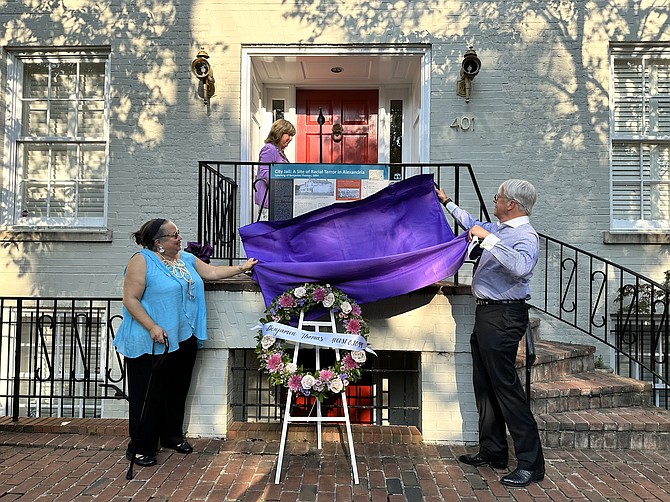Audrey Davis of the Alexandria Community Remembrance Project, left, joins homeowner Walter Steimel in unveiling a temporary plaque Aug. 8 at 401 N. St. Asaph Street. A permanent plaque will commemorate the site of the former city jail where a mob dragged 16-year-old Benjamin Thomas out of his cell to be lynched a few blocks away.
Hundreds gathered on North St. Asaph Street Aug. 8 to participate in the unveiling of a marker commemorating the site of the former city jail where 16-year-old Benjamin Thomas was dragged from a cell to be lynched at the corner of King and Fairfax streets 124 years ago.
It happened around midnight, Aug. 8, 1899, when a mob of 2,000 white Alexandrians attacked the city jail. With a rope around his neck, Thomas was dragged to the intersection known as Leadbeater Corner opposite Market Square. Along the way, he was pelted with stones and pieces of iron, stabbed and shot several times before being hanged from a lamppost.
“This site is steeped in racial oppression,” said Beulah Baptist Church Rev. Professor Quadricos B. Driskell. “We are gathered to remember that on this date 124 years ago a 16-year-old black Alexandrian named Benjamin Thomas was pulled from this building by a white lynch mob and dragged a half mile across cobblestone streets to his death. Please take a moment to reflect and dare I even say to pray on this.”
Two years earlier, on April 23, 1897, another African American teenager, Joseph McCoy, was lynched at the corner of Cameron and Lee streets after being pulled from his cell at the police station. A historic marker has been dedicated at that site.
The markers are part of the Alexandria Community Remembrance Project, which is working with the Equal Justice Initiative based in Montgomery, Ala.
Joining Driskell in the remembrance ceremony for Thomas were descendants of the Thomas family, Gretchen Bulova and Audrey Davis of the Alexandria Community Remembrance Project, Alexandria City High School student Mahmoud Abu, who read a narrative of the event, Shiloh Baptist Church Rev. Dr. Taft Quincey Heatley, and Alexandria Sheriff Sean Casey.
 Beulah Baptist Church Rev. Professor Quardricos B. Driskell addresses the crowd at the site of the 1899 lynching of Benjamin Thomas at the corner of King and Fairfax streets.
Beulah Baptist Church Rev. Professor Quardricos B. Driskell addresses the crowd at the site of the 1899 lynching of Benjamin Thomas at the corner of King and Fairfax streets.
“Law enforcement’s history of racial oppression must be acknowledged, particularly by those of us who serve in the profession,” Casey said. “We cannot change the past but we hope by acknowledging our failures we might begin to encourage healing and build trust.”
A temporary marker was unveiled at the site of the former city jail prior to a procession through Old Town to the site of Thomas’ lynching at the comer of King and Fairfax streets. A permanent marker is expected to be installed in the coming weeks.
“When I purchased this home in 1999, I knew it had been the jail and as a lawyer I was intrigued by its past use,” said current homeowner Walter Steimel. “What I did not know was this more tragic history of this building. I appreciate the work that was done to uncover this history to commemorate and honor the memories of Joseph McCoy and especially on this date, Benjamin Thomas.”
Steimel has provided an easement to allow for the permanent placement of a marker at the site at the corner of the lot.
“It is a privilege to be able to support the establishment of a permanent marker to provide education year-round,” Steimel said. “A permanent plaque serves to remind us of the injustices of our past and educate those who cannot be here on this annual event.”
Research by the Alexandria Community Remembrance Project committee showed that in both Alexandria lynchings, the white authorities were deliberately complicit in their refusal to name and bring to justice members of the white mob. In the case of Thomas, the officers defending the jail were not prepared to protect the prisoner. Instead, city officials and law enforcement officers obstructed and punished members of the Black community who were willing to stand up to white violence.
“As we have acknowledged and apologized for our predecessors’ role in failing to protect Benjamin Thomas, we also deeply regret that law enforcement officers abused their power, violated the public trust and put white supremacy first – above the law and above public safety,” Sheriff Casey said. “That added to the legacy of racial oppression that continues to impact our community and our country today.”
To learn more about Benjamin Thomas and the events of Aug. 8, 1899, visit the In Memoriam page at Alexandriava.gov/Historic.
